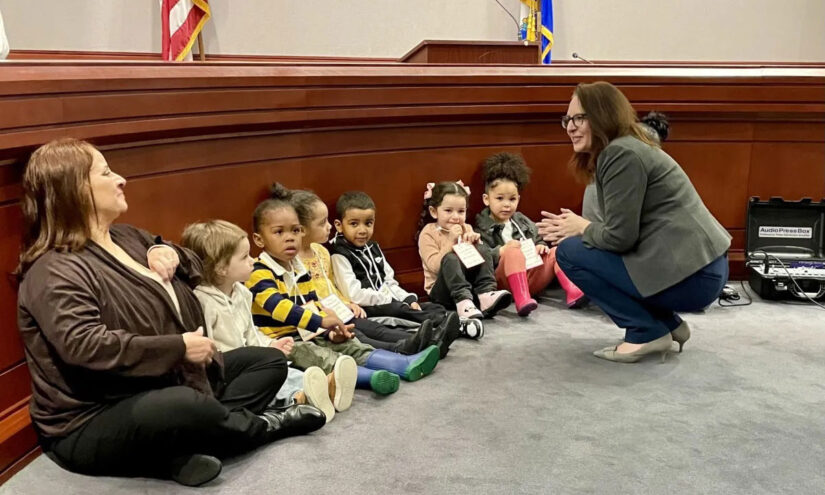During this summer, a team of students from MIT embarked on a journey to the sou …
Connecticut Lawmakers Propose $100M for Child Care Fund
Jennifer Livingstone

A bipartisan coalition of lawmakers in Connecticut aims to allocate state funds to establish and maintain a trust fund dedicated exclusively to supporting early childhood education.
The initiative, outlined in House Bill 5002, intends to allocate an initial $50 million from bond funding and potentially an additional $50 million from the state’s anticipated budget surplus for the current fiscal year to the Early Childhood Care and Education Fund. Furthermore, the fund may be supplemented by private donations, local and federal grants, and other public and private contributions. Oversight of the fund would be managed by an advisory commission comprising state officials, leaders from the child care industry, and representatives from various sectors and philanthropic organizations.
State Representative Kate Farrar, representing D-West Hartford, emphasized that H.B. 5002 is a progression of the recommendations provided by a Blue Ribbon Panel, convened by Governor Ned Lamont last year, which charted a 5-year strategic plan for the state’s child care system.
During a press conference at the Legislative Office Building in Hartford on Thursday, Farrar stated, “It proposes to transform this work… with public and private investments and create a structure that ensures we have funding now and into the future.”
However, Beth Bye, the commissioner of Connecticut’s Office of Early Childhood, voiced reservations about the bill, particularly regarding a provision that tasks the trust fund’s advisory commission with formulating a 10-year plan for child care expenditure and legislative adjustments to support the system.
Bye expressed in written testimony, “The Blue Ribbon five-year plan provides a vision for Connecticut’s child care infrastructure that will improve access to quality care for thousands of families through efforts aimed at affordability, stabilizing and expanding child care businesses, and improving the quality of programs. The plan was informed by thousands of providers, parents, businesses, and interested residents and evolved significantly… A new planning process would simply be duplicative of this valuable work.”
Furthermore, Bye highlighted the existence of an already established Early Childhood Education Fund, created by the legislature the previous year, which is allowed to receive philanthropic donations to bolster early childhood education.
State Comptroller Sean Scanlon, responsible for overseeing the trust fund, confirmed the current absence of funds in the existing account. He expressed support for the proposal to initiate the fund with public funds and establish a commission for its supervision, where he would serve as a co-chair.
“Part of the rationale for doing this is that wealthy people and foundations don’t just give money to things that have no structure to them and no game plan,” Scanlon stated. “The bill does put some seed money into this, but the goal is that both the legislature and private donations would bolster that fund to get to a sufficient point where we could actually do things in the governor’s Blue Ribbon plan that cost a lot of money.”
House Speaker Matt Ritter, representing D-Hartford, conveyed that the trust fund will not immediately resolve Connecticut’s child care dilemma. He emphasized the necessity for incremental investments into the fund to drive progress.
Ritter proposed several potential approaches for the state to contribute annually to the fund, such as using the interest from the budget reserve fund or directing a portion of any budget surplus. Another suggestion involved matching private donations up to a specified amount each year.
“There are creative ways to do it, but it’s going to take a little bit of time to work it out,” Ritter explained. “We can’t just write a check for $2 trillion and fund it forever in perpetuity, but we can begin to make down payments on it.”
The advisory commission’s responsibility would encompass developing innovative solutions toward this goal.
Later that same Thursday, Jacob Vigil from New Mexico Voices for Children, an advocacy group focused on children and economic policies, testified before the Finance, Revenue and Bonding Committee regarding New Mexico’s early childhood trust fund, established in 2020. This fund commenced with an initial $300 million allocation and received ongoing sustenance from a portion of surplus oil and gas revenues.
Vigil described the program as a “generational transformation,” noting the substantial growth of the fund to over $5 billion by the 2024 legislative session, as estimated by the state legislative economist.
During the hearings, State Senator John Fonfara, a co-chair of the committee, expressed caution towards a significant investment of limited state funds. He questioned the practicality of adding more programs or funding to address prevailing challenges, emphasizing the critical need to provide essential support for vulnerable children.
Georgia Goldburn, a former elementary school teacher and current director of the child development center Hope for New Haven, drew a parallel in her testimony. Goldburn compared the state’s current allocation strategy to building a house, illustrating the inefficiency of allocating only a minimal percentage for construction and reserving the majority for repairs.
She argued, “Instead of taking 10%, or a minimal amount of money, to build a brain at the most critical time for lifelong learning, we [would be] investing significantly more in these early learning years. So that the remediation that we have to do — in special education or the prison pipeline — all of those things will be deemed moot.”

